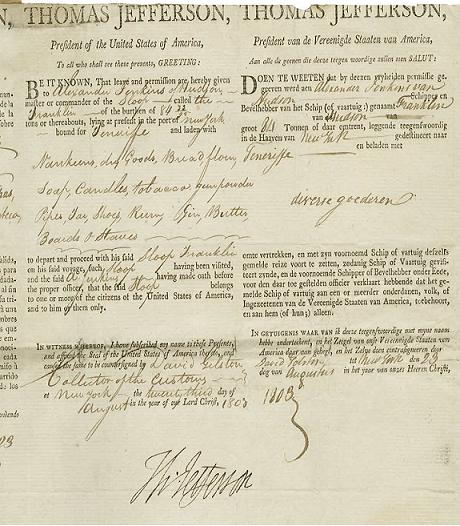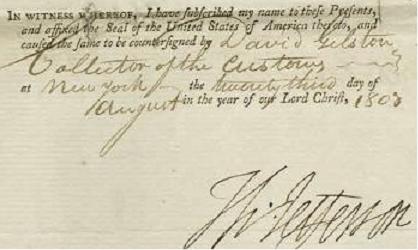David Barton will be coming out with a book called The Jefferson Lies next spring. I noted here that he is skilled at spreading them which will make the book entertaining at the least.
As a service in the effort at offsetting lies about Thomas Jefferson, I thought it might be helpful to point Barton to a letter from Thomas Jefferson to Thomas Cooper. The letter, written on February 10, 1814 sets out Jefferson’s argument that British common law was not influenced by Christianity in any direct manner. Thus, any indirect claim that our law was based on Christianity indirectly via influence from Britain is also suspicious. Barton promotes the notion that American law derives from the Bible. He has also argued that Jefferson did not mean for the state to separate Christianity from the operation of the state.
Jefferson, on the other hand, wrote to Thomas Cooper that Christianity came to Britain after common law was established. Jefferson began his letter,
DEAR SIR, — In my letter of January 16, I promised you a sample from my common-place book, of the pious disposition of the English judges, to connive at the frauds of the clergy, a disposition which has even rendered them faithful allies in practice. When I was a student of the law, now half a century ago, after getting through Coke Littleton, whose matter cannot be abridged, I was in the habit of abridging and common-placing what I read meriting it, and of sometimes mixing my own reflections on the subject. I now enclose you the extract from these entries which I promised. They were written at a time of life when I was bold in the pursuit of knowledge, never fearing to follow truth and reason to whatever results they led, and bearding every authority which stood in their way. This must be the apology, if you find the conclusions bolder than historical facts and principles will warrant. Accept with them the assurances of my great esteem and respect.
Then, Jefferson included a portion of his writings on the subject from a past effort. He notes that the belief in the Christian influence on British law has been assumed by various writers, but not proven. He says they have all quoted each other as authorities.
Thus we find this string of authorities, when examined to the beginning, all hanging on the same hook, a perverted expression of Prisot’s, or on one another, or nobody. Thus Finch quotes Prisot; Wingate also; Sheppard quotes Prisot, Finch and Wingate; Hale cites nobody; the court in Woolston’s case cite Hale; Wood cites Woolston’s case; Blackstone that and Hale; and Lord Mansfield, like Hale, ventures it on his own authority.
The crux of the matter for Jefferson is that Christianity was not adopted by the British as common law. He wrote:
For we know that the common law is that system of law which was introduced by the Saxons on their settlement in England, and altered from time to time by proper legislative authority from that time to the date of Magna Charta, which terminates the period of the common law, or lex non scripta, and commences that of the statute law, or Lex Scripta. This settlement took place about the middle of the fifth century. But Christianity was not introduced till the seventh century; the conversion of the first christian king of the Heptarchy having taken place about the year 598, and that of the last about 686. Here, then, was a space of two hundred years, during which the common law was in existence, and Christianity no part of it. If it ever was adopted, therefore, into the common law, it must have been between the introduction of Christianity and the date of the Magna Charta. But of the laws of this period we have a tolerable collection by Lambard and Wilkins, probably not perfect, but neither very defective; and if any one chooses to build a doctrine on any law of that period, supposed to have been lost, it is incumbent on him to prove it to have existed, and what were its contents. These were so far alterations of the common law, and became themselves a part of it. But none of these adopt Christianity as a part of the common law. If, therefore, from the settlement of the Saxons to the introduction of Christianity among them, that system of religion could not be a part of the common law, because they were not yet Christians, and if, having their laws from that period to the close of the common law, we are all able to find among them no such act of adoption, we may safely affirm (though contradicted by all the judges and writers on earth) that Christianity neither is, nor ever was a part of the common law. Another cogent proof of this truth is drawn from the silence of certain writers on the common law. Bracton gives us a very complete and scientific treatise of the whole body of the common law. He wrote this about the close of the reign of Henry III., a very few years after the date of the Magna Charta. We consider this book as the more valuable, as it was written about fore gives us the former in its ultimate state. Bracton, too, was an ecclesiastic, and would certainly not have failed to inform us of the adoption of Christianity as a part of the common law, had any such adoption ever taken place. (my emphasis)
Then Jefferson ends his argument by noting that Exodus was meant for the Jews and the teachings of Jesus were meant to be followed as conscience dictated not by coercion of the state.
In truth, the alliance between Church and State in England has ever made their judges accomplices in the frauds of the clergy; and even bolder than they are. For instead of being contented with these four surreptitious chapters of Exodus, they have taken the whole leap, and declared at once that the whole Bible and Testament in a lump, make a part of the common law; ante 873: the first judicial declaration of which was by this same Sir Matthew Hale. And thus they incorporate into the English code laws made for the Jews alone, and the precepts of the gospel, intended by their benevolent author as obligatory only in foro concientiae; and they arm the whole with the coercions of municipal law. In doing this, too, they have not even used the Connecticut caution of declaring, as is done in their blue laws, that the laws of God shall be the laws of their land, except where their own contradict them; but they swallow the yea and nay together. Finally, in answer to Fortescue Aland’s question why the ten commandments should not now be a part of the common law of England? we may say they are not because they never were made so by legislative authority, the document which has imposed that doubt on him being a manifest forgery.
Note at the end that he denies that the 10 Commandments were ever a part of the common law of England. As for America, one cannot read this letter and think that Jefferson supported the concept, popular among proponents of a Christian America, that the “laws of God shall be the laws of their land.”


